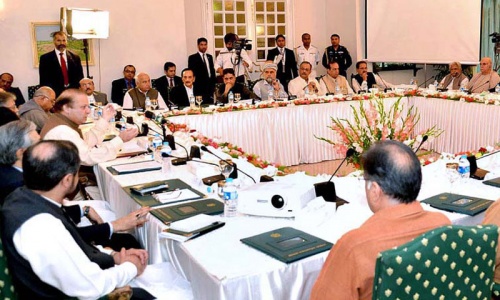DERA ISMAIL KHAN: The armed forces of Pakistan and Taliban militants exchanged prisoners Wednesday as a confidence building measure ahead of possible peace talks, intelligence officials and militant commanders said.
The exchange included six militants of Tehrik-i-Taliban Pakistan (TTP) and two paramilitary Frontier Corps soldiers, officials and the commanders said.
It occurred in the Shawal area of the South Waziristan tribal region. The militants were subsequently taken to neighboring North Waziristan, the country's main Taliban sanctuary.
Militants fired in the air with joy when their colleagues were freed, the intelligence officials said. The officials and two Taliban commander spoke on condition of anonymity because they were not authorised to talk to journalists.
However, the Pakistan army has rebutted reports of such a swap.
“Pakistan military rejected the news of any prisoner swap with Taliban, as being reported by a foreign news agency,” the army spokesperson, Major General Asim Saleem Bajwa said in a text message to the media representatives.
Despite the denial by Pakistan's military public affairs office, the intelligence officials and Taliban commanders provided the names of the militants who were freed and said the two paramilitary soldiers released were kidnapped by the Taliban in southwest Balochistan province in March 2012.
The release occurred only days after Pakistan's main political parties endorsed peace negotiations with the Taliban and their allies Monday as the best way to end a decade-long insurgency that has killed thousands of people.
The exchange was meant to build confidence between the government and the militants before formal peace talks, the Pakistani Taliban commander said.
Senior Taliban leaders are currently discussing whether to take the government up on its offer to hold negotiations, said the commander and one of his colleagues.
The Taliban said they were open to talks at the end of last year but withdrew that offer in May after the group's deputy leader, Waliur Rehman was killed in a US drone strike.
Pakistani Prime Minister Nawaz Sharif campaigned on a platform of holding peace talks and has maintained that line since he took office in June. He scored a victory when his stance was endorsed by other parties on Monday – a decision that was generally welcomed by the Taliban.
But there are plenty of skeptics who doubt negotiations actually will bring lasting peace. The government has struck various peace deals with the Taliban in the past, but all have fallen apart. Critics say the agreements simply gave the militants time to regroup and continue their fight against the state.
“Not only is the path well worn, it is also a path that has on every previous occasion been attempted and led to failure, mutual recrimination and renewed bloodshed,” an editorial published Wednesday in a Pakistani newspaper said.
The editorial also pointed out that it's unclear with whom exactly the government would negotiate. Analysts say there are more than 100 militant groups operating in Pakistan's tribal region along the Afghan border with varying levels of allegiance.
“Then there is the question of just what is on the table, what is up for negotiation,” the editorial said. “No iteration of the Taliban either historically or in recent years has wanted anything other than the dismantling of the democratic process, the dissolution of legislatures at the federal and provincial levels, and the imposition of their own narrow interpretation of religion.”
It's also unclear what kind of negotiated peace Pakistan's army, considered the country's most powerful institution, would accept after losing hundreds of its soldiers in combat with the Taliban.
A peace deal could worry the United States if it gives more breathing room to Afghan militants in Pakistan who carry out cross-border attacks against American troops in Afghanistan.
The Afghan and Pakistani Taliban are allies but have aimed their guns at different targets. The Afghan Taliban have fought coalition forces in Afghanistan, while the Pakistani Taliban have taken on the government at home.












































